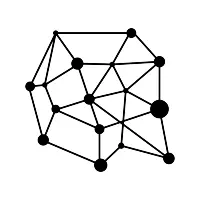We are all in love with decentralized social topology, aren’t we. But to make society reasonably decentralized, we need to remodel more than one level of it. I would like to bounce around some thoughts that may help establish a multilayer model of decentralized society.
::: Longwinded
- Assumptions.
1.1. I use communications as an example of social activity that is a key to all other processes.
1.2. I assume that a decentralized network of heterogeneous communities is a good model for human society that we need now, as the all-crisis unfolds and neither democracy nor (even less) capitalism can offer any constructive approach.
1.3. I assume that the minimal provisions for an individual must include the right to participate in more than one community at the same time, the right to opt-out peacefully at any moment and the right to form a community (and participate in the network) on an equal basis.
- Layers
2.1. “Fediverse”. What we now see as fediverse is an implementation of communications pattern, where instances of various services can be associated with specific communities and their local users considered community members. Federation protocol provides a routine way to regulate interactions with other communities.
2.2. “Community Intranet”. To control their collective memory, their policies/rituals and their boundaries, communities need to have control over the physical infrastructure of their “village intranet”. It applies mostly to “natural” (local) communities, while “virtual” ones may need a trusted and neutral virtual hosting environment. The control should not, however, influence individual participation in remote communities.
2.3. “NetCommons”. To keep the information flowing, society needs a non-owned, collectively managed transmission backbone. We can draw analogies with watershed management that is a known example of advantages and shortages of the commons approach.
2.4. “Platform Cooperatives”. Economic (and, effectively, political) control of the means of production is a key to stability of the ecosystem. Thus, decentralized ecosystem of user cooperatives provides cohesion to the whole multilayered model. Every user becomes a member of the co-op(s) operating their community(ies) infrastructure. Community co-ops then form the “NetCoooperative”, managing and maintaining the backbone systems and providing support, R&D and exception handling to communities in need.
- Essential question is, whether such a model is comprehensive and complete enough to provide scaffolding for an attempt to implement proof-of-concept project.
Questions and comments welcome.
:::

why can’t we rely on democracy? do you mean electoral politics? seems to me like democracy would be an essential principle for decision-making within these communities
[short] We can if we agree on it. But we do not have to.
[long] The question that I have been trying to address is the tension (dialectical, should I say) between self-determination and cooperation. On the community level, it is all about self-determination. People are absolutely free to arrange their mutual social dynamics as they see fit.
On the network (inter-community) level, we need a minimal, possibly protocol-driven (con)federation, focused on cohabitation, communication and cooperation to maintain and develop common infrastructure. As long as a community adheres to it, it is considered a member of society with all obligations and privileges attached.
Democracy, as one of ancient political concepts, carries a legacy of misinterpretations, twisted definitions and “forks” – each of them claimed to be “the only right and true”. As such it is quite prone to hacking, infights, and general stalling. So, while I am delighted to see it remixed gazillionth time in a neighbouring community, I am reluctant to trust it humanity’s life support, the infrastructure.
Luckily, we have at least two tested and working ways to manage the very infrastructure we use now – the internet – and whether they are considered democratic or not, they work.
While I prefer a lazy consensus framework, which also amplifies to the aspect of (ir)reversability of our deeds, pretty important on a moral ground, both models are working well enough and thus can be built upon. If one calls them democratic, it will be a bonus as well. :-)
Yes, well described, thank you. As an example of a discussion that is related, on SocialHub there’s this topic "What would a fediverse ‘governance’ body look like?. That is quite interesting to consider, especially since fediverse is not one body, but constitutes the heterogenous community fabric that Petros describes.
Probably there is no one governance body that would work. There’s many Governance models at work, and at many different levels. Question arises, if my governance model is different than yours, what does that mean for the ways in wich we can cooperate? Do we even want, or are capable of, formally defining that. I expect in some cases we might, in others we don’t. And that is just fine, as long as things can evolve organically. Some form of basic structure - a Governance meta-model, if you will - might be a helper here, providing framework and guidance.
The incentives of themocracy are really poor, high time preference and the beliving that we can solve our problems at the expense of others, plus is a sistem that imposes what the mayority whants (and nothing prevents the mayority from wanting terrible things)